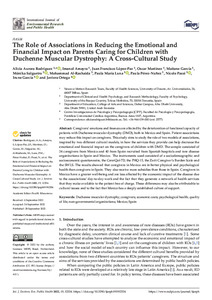Por favor, use este identificador para citar o enlazar este ítem:
https://repositorio.uca.edu.ar/handle/123456789/15186| Título: | The role of associations in reducing the emotional and financial impact on parents caring for children with duchenne muscular dystrophy : a cross-cultural study | Autor: | Rodríguez, Alicia Aurora Amayra Caro, Imanol López Paz, Juan Francisco Martínez, Oscar García, Maitane Salgueiro, Mónika Al-Rashaida, Mohammad Luna, Paula María Pérez Nuñez, Paula Passi, Nicole García, Irune Ortega, Javiera |
Palabras clave: | DISTROFIA MUSCULAR DE DUCHENNE; CUIDADORES; SALUD MENTAL; CALIDAD DE VIDA; ORGANIZACIONES NO GUBERNAMENTALES; NIÑOS | Fecha de publicación: | 2022 | Editorial: | Multidisciplinary Digital Publishing Institute | Cita: | Rodríguez, A.A. et al. The role of associations in reducing the emotional and financial impact on parents caring for children with duchenne muscular dystrophy : a cross-cultural study [en línea]. Int. J. Environ. Res. Public Health 2022, 19. doi: 10.3390/ijerph191912334. Disponible en: https://repositorio.uca.edu.ar/handle/123456789/15186 | Proyecto: | Enfermedades neuromusculares poco frecuentes en edad pediátrica: funcionamiento familiar, adaptación psicológica y apoyo social percibido por los padres como factores asociados a la calidad de vida del niño | Resumen: | Abstract: Caregivers’ emotions and finances are affected by the deterioration of functional capacity of patients with Duchenne muscular dystrophy (DMD), both in Mexico and Spain. Patient associations may reduce this impact on caregivers. This study aims to study the role of two models of associations, inspired by two different cultural models, in how the services they provide can help decrease the emotional and financial impact on the caregivers of children with DMD. The sample consisted of 34 caregivers from Mexico and 40 from Spain recruited from Spanish hospitals and rare disease organizations in Spain and Mexico. The instruments used consisted of a sociodemographic and socioeconomic questionnaire, the CarerQol-7D, the PHQ-15, the Zarit Caregiver’s Burden Scale and the SWLS. The results showed that caregivers in Mexico are in better physical and psychological health than caregivers in Spain. They also receive more subsidies than those in Spain. Caregivers in Mexico have a greater well-being and are less affected by the economic impact of the disease due to the associations’ day-to-day work and the fact that they generate a network of health services that they make available to the patient free of charge. These differences may also be attributable to cultural issues and to the fact that Mexico has a deeply established culture of support. | Cobertura Espacial: | España México |
URI: | https://repositorio.uca.edu.ar/handle/123456789/15186 | Disciplina: | PSICOLOGIA | DOI: | 10.3390/ijerph191912334 | Derechos: | Acceso abierto | Fuente: | Int. J. Environ. Res. Public Health 2022, 19 |
| Aparece en las colecciones: | Artículos |
Ficheros en este ítem:
| Fichero | Descripción | Tamaño | Formato | |
|---|---|---|---|---|
| role-associations-reducing-emotional.pdf | 386,37 kB | Adobe PDF |  Visualizar/Abrir |
Visualizaciones de página(s)
55
comprobado en 27-abr-2024
Descarga(s)
53
comprobado en 27-abr-2024
Google ScholarTM
Ver en Google Scholar
Altmetric
Altmetric
Este ítem está sujeto a una Licencia Creative Commons

